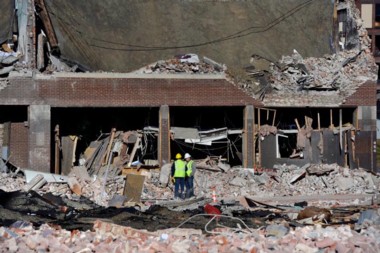Windows shattered through an area with a three-block radius when a gas pipeline leak exploded in Springfield the day after Thanksgiving. The blast that destroyed Score’s Gentlemen’s Club and damaged 41 other buildings has people all over the Valley wondering what pipeline will blow up next.
No one died in the explosion in Springfield. But in Amherst in 2006, a gas explosion at the condominium complex in Echo Hill killed one resident and left her husband with serious burns.
Other gas leaks have been in the news lately. One leak on Route 9 near Applebee’s forced traffic to detour for an hour on a recent Monday morning. That leak was believed to have been the result of a cable company striking a gas line.
But in Massachusetts’ 20,000 miles of gas pipelines, there are at least 20,000 known leaks, according to state representative Lori Ehrlich of Marblehead. Some estimate that the number may be closer to 22,000 or even 25,000. Not only are they dangerous, says Ehrlich, but gas—billions of cubic feet each year—is wasted. There is environmental damage as well, since natural gas is methane, a major contributor to global warming. And on some city streets, leaking gas is killing trees.
The Massachusetts Department of Public Utilities is supposed to inspect gas pipelines. But the department only has seven engineers—not enough to carry out all the inspections that are needed, according to Mark McDonald, president of the New England Gas Workers’ Association. Gas companies, too, “just don’t have the staff to do it,” McDonald said. They had larger staffs, he said, “before 1998, before deregulation.” After his election a few years later, “[President George] Bush allowed holding companies to buy gas companies,” he added. “Workers and management who knew the company are now gone.”
For four years, McDonald and Ehrlich have been working to get the state to require more systematic pipeline inspections and prompt repairs. Together the two wrote a bill that in its early version, Ehrlich told the Advocate, “was basically killed in committee by the gas companies, which didn’t want a bill telling them how to do their business.”
But after undergoing modifications on its long way through the legislative process, the bill was approved unanimously by the House in June, and will pass by the end of the year, Ehrlich hopes.
The bill, H4222, would mandate, first of all, a classification system for pipeline leaks, and require grade one leaks, those designated dangerous to life and property, to be repaired immediately. Grade two leaks, those considered not immediately hazardous but potentially hazardous, would have to be repaired within 15 months or less. Grade three leaks would have to be monitored. Programs to monitor gaslines more intensively in the winter, when they can fracture, would be put in place. Information about the locations of leaks would have to be shared with local police and fire departments.
At the moment, the bill is in the Senate Ways and Means Committee. Ehrlich urges people who are concerned about gas leaks to call their senators and urge them to get it to the floor. If the bill passes, she says, “I have no doubt that it will save lives. It will save money. It will save an important resource.”•



